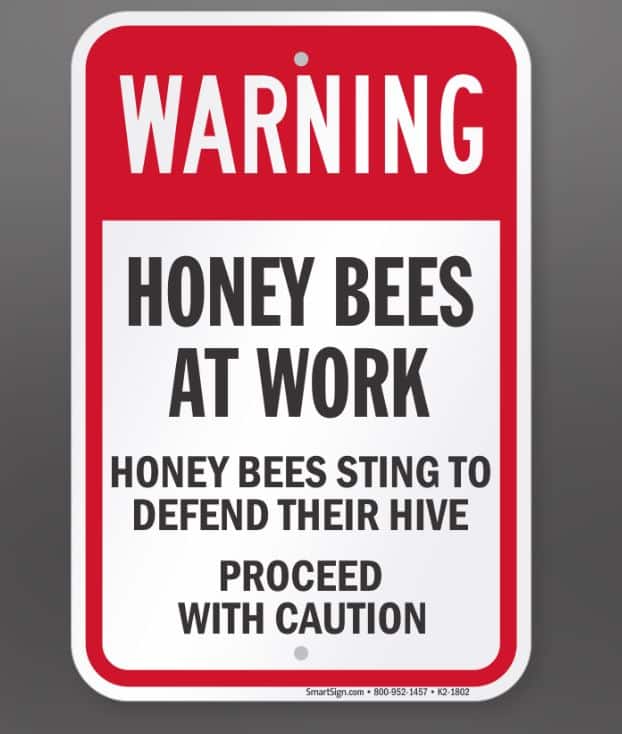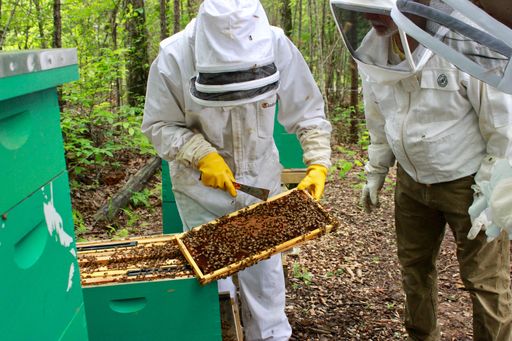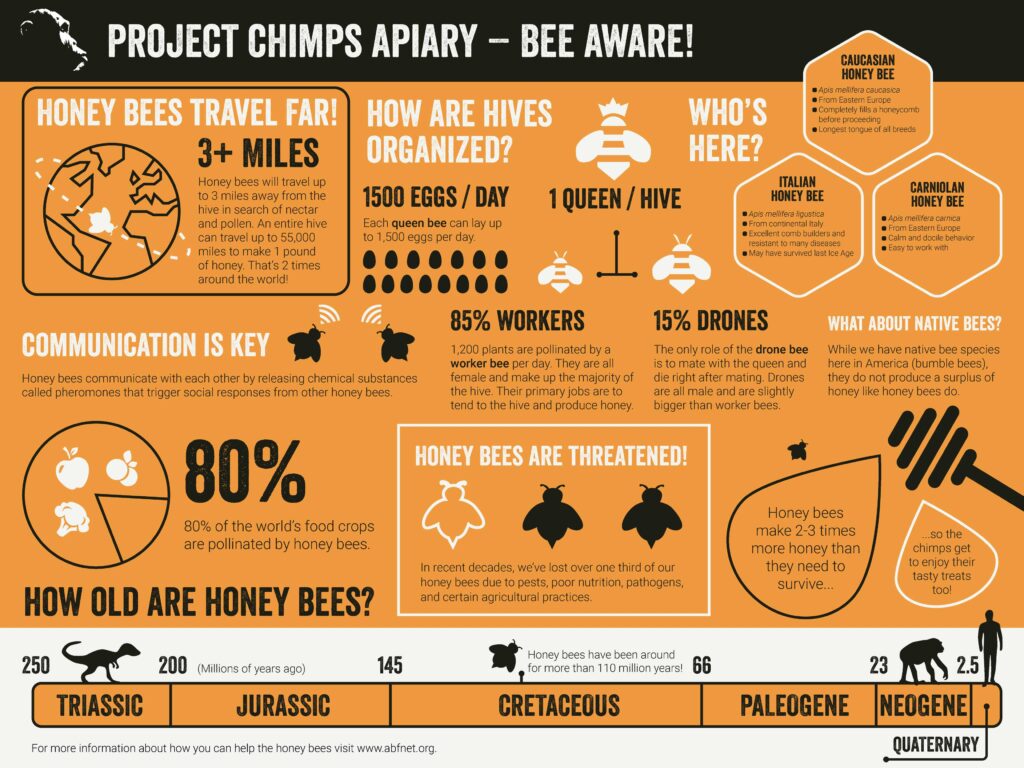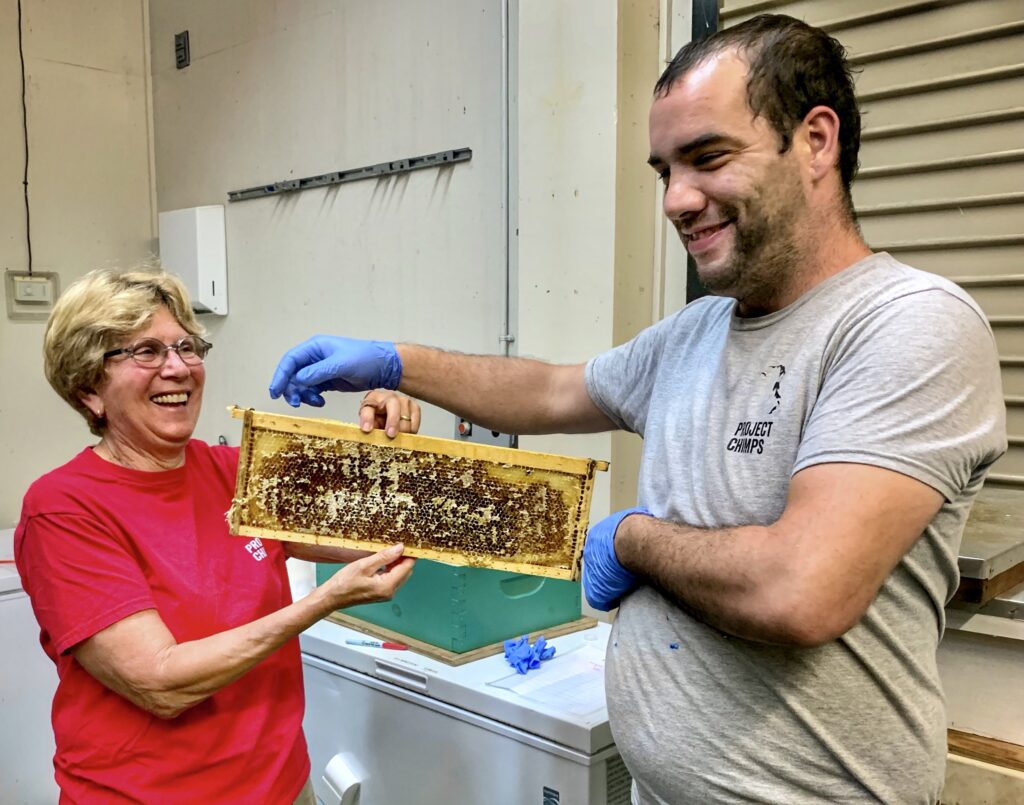
Sustainability is the Bee’s Knees at Project Chimps!

By Marissa Pena
Did you know that chimpanzees aren’t the only animals we take care of at Project Chimps? It’s true! Chimps love honey, and with 96 retired research chimps living with us, we go through a lot of it.
We’re proud to say our sanctuary is also a safe home for thousands of honeybees that live in our apiary. Not only is this an important part of our mission to provide our chimps with exemplary lifelong care, but it’s also one of the ways we give back to the forest that’s become their forever home. If you’d like to learn more about our sustainability practices and how we keep the bees (and our chimps) happy and healthy, just keep reading!
A Day in the Life of a Beekeeper at Project Chimps
Jesse Ellsworth has been with Project Chimps for almost two years. She started out in the medical team before making the switch to chimp care, where she liked that she could spend more time getting to know the chimps day-to-day.
However, those aren’t her only talents! In addition to her hard work as a caregiver aide, Jesse is also one of the beekeepers in our apiary.

“I started working with bees a few years ago. I was just following interests, and one of those led me into an internship with this beekeeper who raised queens. I spent a summer there just soaking up a bunch of knowledge and learning everything I could. When I came to Project Chimps, I knew they had an apiary and wanted to get involved. I had missed the bees, so it was just kind of a natural path that led me here,” she explains.
“We try to do inspections weekly, which is us just checking up on the bees and seeing how they’re doing. A lot of that is checking up on our queen. We don’t have to see her every week, but we like to at least see signs of her, like making sure we have eggs during laying season, checking the brood, and our pest control. Mainly just checking on their general health to see if we need to intervene or do anything to support them.”
Our Resident Bees
Our apiary currently contains five hives, but we’ll be receiving two more packages in only a couple of weeks! Each package contains 5 pounds of bees and one queen we’re excited to safely set up in their new home.
There’s always something going on in the apiary, and a big part of what our beekeepers do is just making sure the bees are able to run their hives the way they do best! We limit the frequency of our inspections in order to give them space that’s as free from interruption as possible.
“I think a day in the life of a bee is just fascinating,” Jesse enthuses. “You’ve got your queen, your females which are the worker bees, and your drones which are the males. There’s so much that goes into how they grow and run things. Since it’s gotten warmer, the queen has been laying a bunch of eggs, and a lot of them were drone eggs. For queen bees, laying unfertilized eggs creates a drone. When they create a mix of drones and workers, it’s a sign they expect good things to be happening, because drones don’t help out with food or collecting or anything like that. They’re kind of just there to hang out. So now that there’s been a lot more, it’s a good sign, it means things are going well.”
Paying attention to signs like these is a big part of helping us continue to responsibly care for our hives! Part of our commitment to sustainability includes making sure not to take more than our bees can provide.

Sustainable Harvesting
It’s important for us to remember that bees don’t produce honey to feed humans or chimpanzees — it’s for them! Although bees also eat pollen and nectar, they’re counting on the honey they’ve been making to last them through winter. It’s true that bees will make as much honey as they can, but it isn’t always more than they need. There’s a delicate balance between identifying a true excess and honey they’ve set aside in order to survive.
“A big part of our sustainability practices has to do with honey collecting,” Jesse explains. “When we do a harvest, we want to make sure we’re leaving enough that they’ll have food for winter without having to give them sugar water. Sugar water feeds them, but it’s not healthy, because it doesn’t have the same nutrients honey does for them. So it’s important for us to not take more than we should and let them live their bee lives.”

In addition to harvesting only the excess, we only use it to sweeten the chimps’ medications and provide important enrichment.” . Wild chimps love honey so much they create specialized tools just to get some, and our chimps are no different! When we do complete a harvest, it’s exciting knowing the chimps will get to enjoy a treat, especially when we know we’re also taking care of the hardworking bees that made it all possible.
Volunteering at the Apiary
As we gear up to expand our apiary, we want to call out to those looking to join the fun! Whether you’re a seasoned beekeeper or are just interested in learning more, we’d love to have you volunteer with us!
“We’re always excited to have people with us that just want to learn!” Jesse says. “Whatever your experience is, you’re welcome to join in. It’s fun to learn and we love having people who are interested.”
“The main thing is really creativity! When we had some hive beetle problems a while back, we had some people researching different options and then we’d go and build these different things we could use to trap and take them away. You don’t need to know a lot, but for people that are willing to go out and learn, that’s always a great help.”
Sustainability Practices and Giving Back
At Project Chimps, we’re always looking for ways to preserve and protect our planet’s natural resources. We’ve spoken about the importance of biodiversity before, and healthy bee populations help protect the forest around our sanctuary. While our apiary focuses on honeybees, we also provide homes for the wild mason bees that live in the forest!
“Bees contribute so much of the food we eat, and without them we’d really be up a creek,” says Jesse. “That’s one of our big things here. Yes, we do it to collect honey for the chimps, but it’s also a way we can give back to the earth, which is what we’re all about. It’s about giving them a safe spot to do their thing and all the best benefits that we can.”
Thanks to donations from people like you, we’re able to care for our current and future residents in an environmentally sustainable way. Every donation helps us care not just for our chimps, but also for the forest that’s become their forever home. Thank you so much for joining us as we give back to the planet we all share!
If you’d like to support our mission to provide former research chimpanzees with exemplary lifelong care, please consider donating today!

